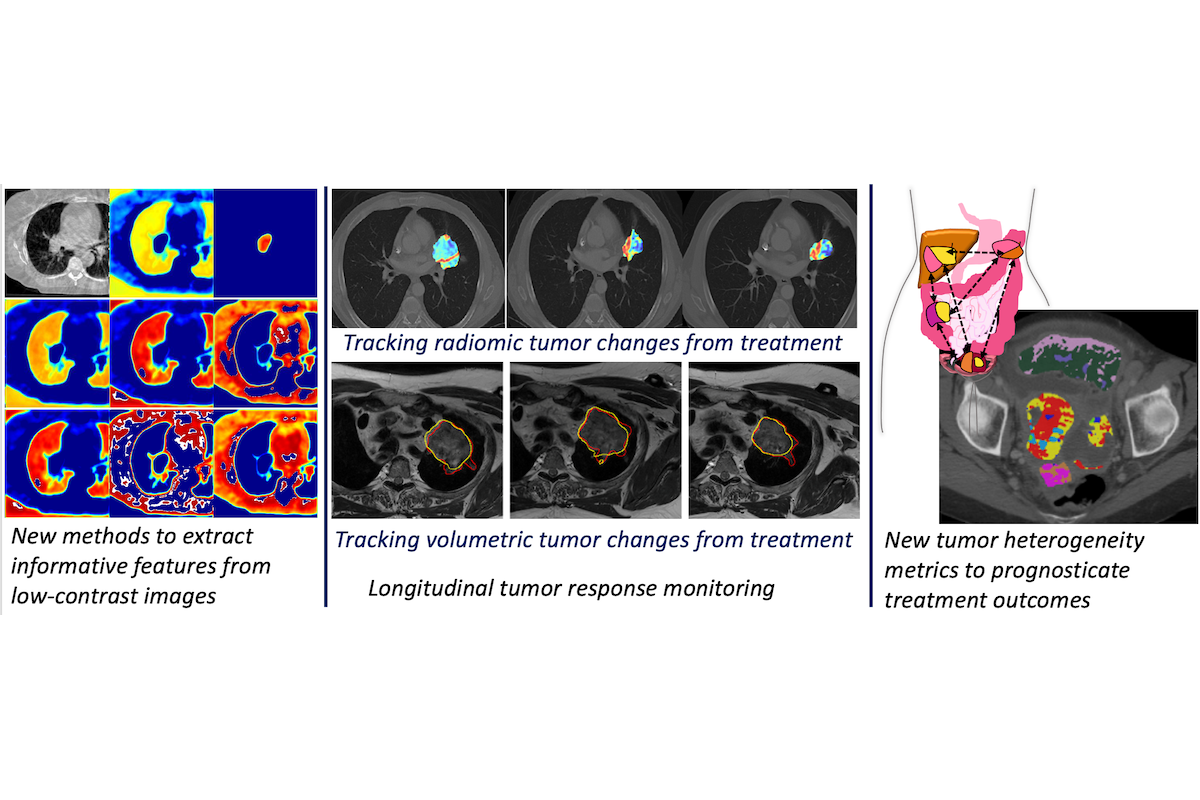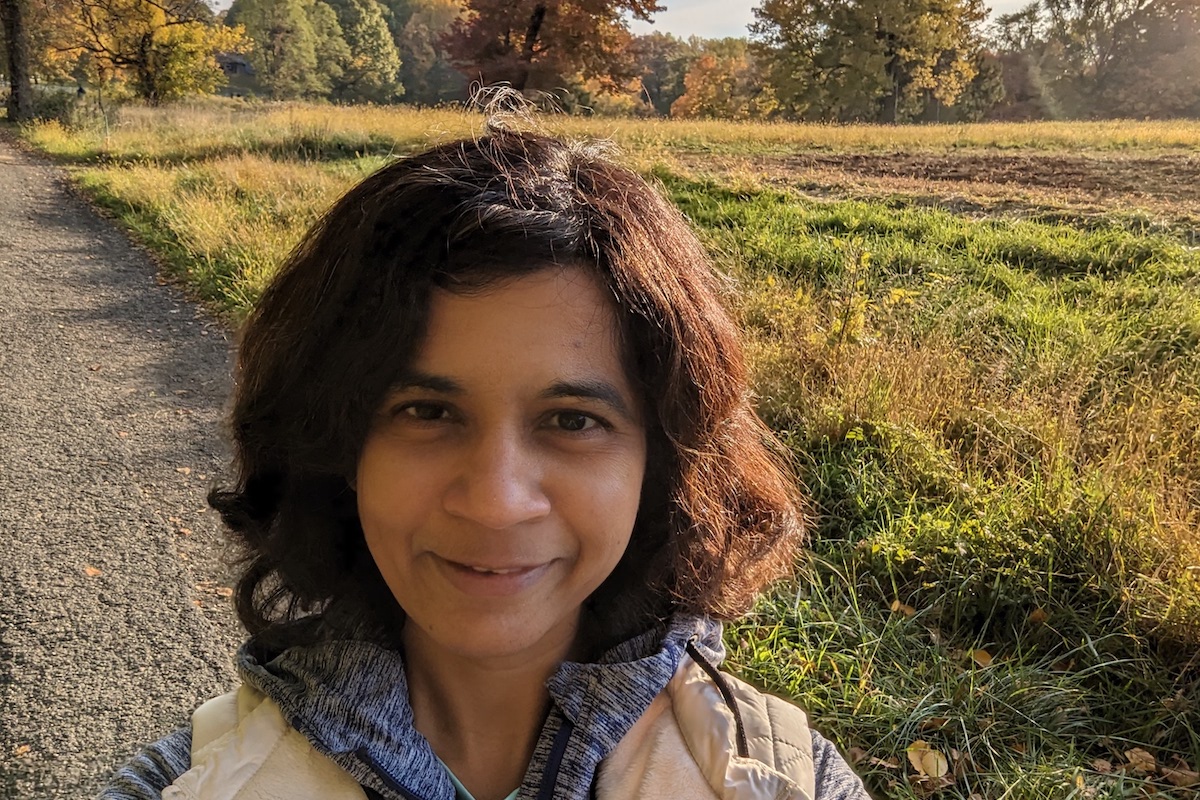Department of Medical Physics
The Harini Veeraraghavan Lab
Research

Computer scientist Harini Veeraraghavan’s lab develops and translates new AI and machine learning tools for diagnosing and personalizing cancer treatments, as well as longitudinally monitoring cancer treatment response from medical images.
Research Projects


Publications
Jiang J, Tyagi N, Tringale K, Crane C, Veeraraghavan H, “Self-supervised 3D anatomy segmentation using self-distilled masked image transformer (SMIT)”, Medical Image Computing and Computer Assisted Interventions. Image foundation model created with self-supervised learning performed through self-distillation using a large cohort of unrelated and curated image sets from multiple disease sites including lung cancers, COVID-19, head and neck cancers, and abdomen cancers. Once pre-trained, the model can be fine-tuned with modest labeled data to different tasks including segmentation on CT, MRI as well as classification.
Horvat N and Veeraraghavan H (equal), Nahas CSR, Bates DDB, Ferreira FR, Zheng J, Capanu M, Fuqua JL 3rd, Fernandes MC, Sosa RE, Jayaprakasam VS, Cerri GG, Nahas SC, Petkovska I, “Combined artificial intelligence and radiologist model for predicting rectal cancer treatment response from magnetic resonance imaging: an external validation study”, Abdominal Radiology, 2022. Validation of a previously developed radiomics model on an independent and external cohort that also showed ability to increase accuracy of less experienced radiologists to the level of more experienced radiologists by adding radiomics classification as additional information.
Jiang J, Elguindi S, Berry SL, Onochie I, Cervino L, Deasy JO, Veeraraghavan H. “Nested block self-attention multiple resolution residual network for multiorgan segmentation from CT”, Medical Physics, 2022. This model is used for auto segmentation of head and neck organs in the MSK radiotherapy clinic.
Thompson HM, Kim JK, Jimenez-Rodriguez RM, Garcia-Aguilar J, Veeraraghavan H. “Deep-learning based model for identifying tumor in endoscopic images from patients with locally advanced rectal cancer treated with total neoadjuvant chemotherapy”, Diseases of Colon and Rectum, 2022. One of the AI assisted approaches to longitudinally evaluate endoscopy images to improve earlier detection of tumor regrowth on patients placed in watch and wait prior to surgery.
Jiang J and Veeraraghavan H., “One-shot PACS: Patient specific anatomic context and shape prior aware recurrent registration-segmentation of longitudinal thoracic cone-beam CTs. IEEE Transactions on Medical Imaging, 2022. Longitudinal tracking of tumor volume response from difficult to interpret cone-beam CTs. Simultaneous registration also allows deformable dose accumulation to objectively quantify deposited radiation to tumor and tissues during treatment course.
People

Harini Veeraraghavan, PhD
Associate Member
- Computer scientist Harini Veeraraghavan's lab develops and translates new AI and machine learning tools for diagnosing and personalizing cancer treatments, as well as longitudinally monitoring cancer treatment response from medical images.
Members



Machine Learning Scientist



Lab Alumni

Goodyear Inc

Machine Learning Scientist, Memorial Sloan Kettering Cancer Center

Medical Physicist, Princess Margaret Cancer Center, Canada

Nationwide Children’s Hospital, Columbus, Ohio, United States

Case Western Reserve University, pursuing PhD
Lab Affiliations
Achievements
- Dr. Veeraraghavan was awarded an NIH R01 grant as contact-PI (with M-PI Dr. Andreas Rimner) for improving safety of lung cancer radiotherapies using AI-based segmentation and tracking of tumor and tissue changes on weekly cone-beam CTs.
- Dr. Veeraraghavan was awarded an Elekta research grant with M-PI Dr. Neelam Tyagi where we are working on developing and evaluating the automated segmentation and tracking of dominant index prostatic lesions from MRI.
- The Veeraraghavan Lab has successfully implemented an AI auto-segmentation solution for radiotherapy planning for head and neck cancer (May 2020) and lung cancer (July 2021), with an MRI-based automated segmentation and registration solution for upper GI organs used for pancreatic cancer treatments under testing prior to release into clinic.
Open Positions
To learn more about available postdoctoral opportunities, please visit our Career Center
To learn more about compensation and benefits for postdoctoral researchers at MSK, please visit Resources for Postdocs
Career Opportunities
The Veeraraghavan Lab has multiple openings involving developing deep learning methods for longitudinal tumor treatment response monitoring, image registration for dose accumulation, as well as developing machine learning methods with sparse and heteromodal data sets for response prediction.